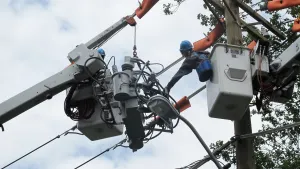More Stories
Taking smart steps to reduce energy use, particularly during periods of peak demand like during the summer, not only helps lower peak load, it will save consumers money.
These low- or no-cost measures will help you save energy:
1. REDUCE HEAT
Close drapes, windows and doors on your home's sunny side to reduce solar heat buildup.
2. DO NOT COOL AN EMPTY HOUSE
Do not cool an empty house. Set your thermostat higher when you are away, or use a smart thermostat to control the temperature in your home.
3. TURN OFF APPLIANCES
Turn off air conditioners, lights and other appliances when not at home and use a timer to turn on your air conditioner about a half-hour before arriving home. Use advanced power strips to centrally "turn off" all appliances and save energy. Use a smart thermostat to control the temperature in your home to control usage during peak summer days.
4. ENERGY STAR
If purchasing an air conditioner, look for an ENERGY STAR qualified model. ENERGY STAR air conditioners use up to 25% less energy than a standard model.
5. USE A FAN
Fans can make rooms feel five to 10 degrees cooler and use 80% less energy than air conditioners. In hot weather, set your ceiling fan to spin quickly, counterclockwise to push air downward toward the floor.
6. 78 DEGREES
Set your air conditioner at 78 degrees or higher to save on your cooling costs.
7. AIR CONDITIONER PLACEMENT
Place your air conditioner in a central window, rather than a corner window, to allow for better air movement. Consider placing the unit on the north, east or the best-shaded side of your home. Your air conditioner will have to work harder and use more energy if it is exposed to direct sunlight.
8. CLEAN FANS
Clean the cooling and condenser fans plus the coils to keep your air conditioner operating efficiently and check the filter every month and replace as needed. Dirty filters make your air conditioner work harder.
9. SEAL
Seal spaces around the air conditioner with caulking to prevent cool air from escaping. Seal holes and cracks around doors and windows with caulk or weather-stripping.
10. USE APPLIANCES WHEN IT'S COOL
Use appliances such as washing machines, dryers, dishwashers and ovens early in the morning or late at night. This will also help reduce humidity and heat in the home. Set refrigerators and freezers to the most efficient temperatures.
11. LIGHT BULBS
Use energy-efficient, ENERGY STAR qualified light bulbs instead of standard incandescent light bulbs, and you can use 75% less energy.
12. MICROWAVE FOOD
Microwave food when possible. Microwaves use approximately 50% less energy than conventional ovens.
13. CLOTHES LINE
Dry clothes on a clothes line. If using a clothes dryer, remember to clean the dryer's lint trap before every load.
14. WATER CONSUMPTION
Be mindful of the different ways you're consuming water throughout your home. Instead of using 30 to 40 gallons of water to take a bath, install a low-flow shower head, which uses less than 3 gallons a minute.
15. COLD WATER
Lowering the temperature setting on your washing machine and rinsing in cold water will reduce energy use.
Source: PSEG Long Island





